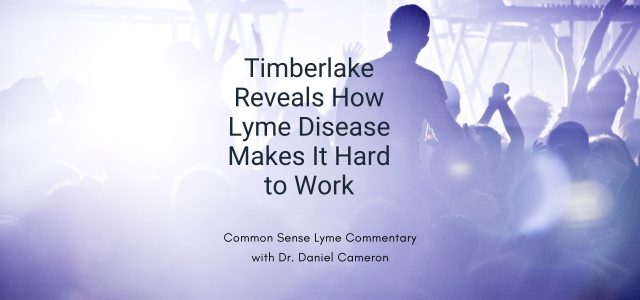
Timberlake Had a Platform. Most Lyme Patients Don’t.
When Justin Timberlake announced that he had been battling Lyme disease during his global tour, he called it “relentlessly debilitating.”
He described performing through nerve pain, fatigue, and recurrent illness—conditions that many Lyme patients know intimately. Timberlake had the support of a tour crew, the flexibility to postpone shows, and the ability to speak publicly about his experience.
But most Lyme patients I see don’t have a stage. They have a shift.
Lyme Disease Makes It Hard to Work—With or Without Fame
In my clinical practice, I’ve seen how Lyme disease disrupts lives—quietly.
Patients push through:
-
Brain fog that makes routine tasks overwhelming
-
Joint and muscle pain that limit physical endurance
-
Fatigue so intense it’s hard to drive, speak, or focus
One patient was a chef who couldn’t remember ingredients. Another was a teacher who lost track of her own lesson mid-sentence. A third worked retail and had to sit in the back room during lunch breaks to recover her energy.
None of them looked sick. But all of them were struggling.
What About Kids with Lyme Disease? School Is Work, Too.
When we talk about how Lyme disease makes it hard to work, we often forget one of the most vulnerable groups: children and teenagers.
For kids, school is their full-time job—and Lyme disease can interfere with every part of it.
In my practice, I’ve seen students:
-
Struggle with reading comprehension due to cognitive fog
-
Miss weeks of school because of relapsing fatigue and pain
-
Feel overwhelmed by light and noise in crowded classrooms
-
Be misdiagnosed with ADHD or anxiety when the root issue was Lyme
-
Lose confidence as their grades and memory declined
One 14-year-old missed over 30 days of school before we diagnosed Lyme. He couldn’t finish his homework, forgot assignments, and felt like he was “getting dumber.” In reality, he was fighting a neurological infection.
Teachers, counselors, and pediatricians should know:
When Lyme affects the brain, school becomes a daily struggle.
These children don’t need pressure—they need recognition, treatment, and sometimes academic accommodations while they recover.
“You Look Fine” Isn’t the Same as Being Fine
Timberlake received backlash for low-energy performances. His illness was invisible to the crowd.
That’s the same experience many patients face at work: their symptoms don’t show on the outside, so their suffering is doubted—or dismissed altogether.
I’ve had patients fired for “underperformance” while dealing with active neurological Lyme. Others pushed through full-time jobs while experiencing vertigo, night sweats, and memory loss. Most were never offered accommodations.
What Timberlake’s Story Reveals
If Lyme disease made it hard for Timberlake to perform, we need to ask: how does it affect the nurse doing 12-hour shifts? Or the single parent with no paid sick leave? Or the college student taking exams while battling neurological symptoms?
Lyme disease makes it hard to work—and too often, no one sees it.
This story is a reminder that chronic illness doesn’t care about status. And that we owe it to patients everywhere to listen more closely.
If This Is You
If you’re working through Lyme disease:
-
You’re not imagining it
-
You’re not lazy
-
And you’re not alone
You are doing more than most people understand—and your experience deserves compassion, not judgment.



I hope Justin Timberlake, REN, Avril Lavigne, Shania Twain will rally and do a covert raising awareness similar to the one done for AIDS in the 80’s. Sadly, Kris Kristopherson succumbed to Lyme. So much suffering and so little care for patients who are literally dying because the medical establishment is in bed with the medical insurance companies and they don’t want to pay for the treatments needed.